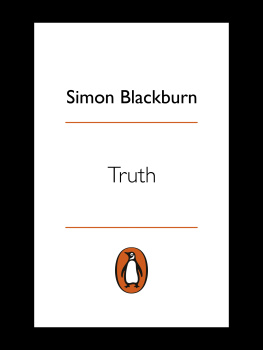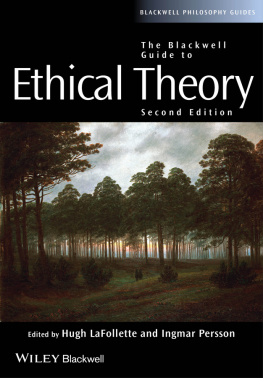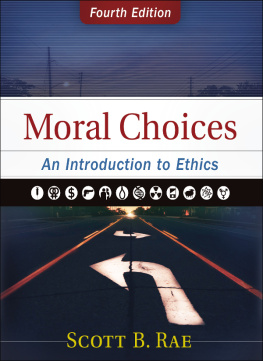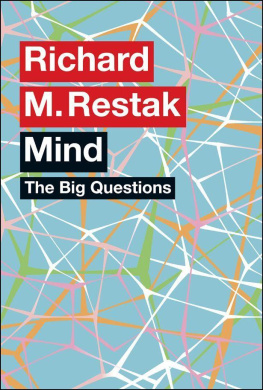Simon Blackburn
ETHICS
A Very Short Introduction


Great Clarendon Street, Oxford OX2 6DP
Oxford University Press is a department of the University of Oxford. It furthers the Universitys objective of excellence in research, scholarship, and education by publishing worldwide in
Oxford New York
Auckland Bangkok Buenos Aires Cape Town Chennai Dar es Salaam Delhi Hong Kong Istanbul Karachi Kolkata Kuala Lumpur Madrid Melbourne Mexico City Mumbai Nairobi So Paulo Shanghai Taipei Tokyo Toronto
Oxford is a registered trade mark of Oxford University Press in the UK and in certain other countries
Published in the United States
by Oxford University Press Inc., New York
Simon Blackburn 2001
The moral rights of the author have been asserted
Database right Oxford University Press (maker)
First published as an Oxford University Press Hardback 2001
First published as an Oxford University Press Paperback 2002
First published as a Very Short Introduction 2003
All rights reserved. No part of this publication may be reproduced, stored in a retrieval system, or transmitted, in any form or by any means, without the prior permission in writing of Oxford University Press, or as expressly permitted by law, or under terms agreed with the appropriate reprographics rights organizations. Enquiries concerning reproduction outside the scope of the above should be sent to the Rights Department, Oxford University Press, at the address above
You must not circulate this book in any other binding or cover and you must impose this same condition on any acquirer
British Library Cataloguing in Publication Data
Data available
Library of Congress Cataloging in Publication Data
Data available
ISBN 13: 978-0-19-280442-6
ISBN 10: 0192804421
5 7 9 10 8 6
Typeset by RefineCatch Ltd, Bungay, Suffolk
Printed in Great Britain by
TJ International Ltd., Padstow, Cornwall
Also available as a larger format paperback,
Being Good
Preface
This Very Short Introduction is shorter than Think, my other introductory book, to which it stands as a younger sibling. Think grew from a conviction that most introductions to philosophy were unnecessarily dry and offputting; the present volume grew from a parallel conviction that most introductions to ethics failed to confront what really bothers people about the subject. What bothers them, I believe, are the many causes we have to fear that ethical claims are a kind of sham. The fear is called by names like relativism, scepticism, and nihilism. I have tried to weave the book around an exploration of them. But by the end it will be up to each reader to decide whether they have been laid to rest, or whether, if like Dracula they rise again, they are at least de-fanged.
I was invited to write this book by the editor of the series, Shelley Cox, whose confidence and encouragement have been towers of strength to me. The actual writing was done (will date the book) at the Research School of Social Sciences of the Australian National University, perhaps the most agreeable place in the world to embark on such a project. I owe thanks to Michael Smith for the hospitality of the School. The University of North Carolina at Chapel Hill has always given me marvellous research support, and an equally marvellous critical audience of colleagues and graduate students. Among them, I owe thanks to Adrienne Martin, who read the proofs. As always, my principal debt is to my wife Angela, whose editorial and typesetting skills are not usually at the service of an author under the same roof, and so needed matching by her equally remarkable patience and cheer.
SWB
24 November 2000
Contents
List of illustrations
Paul Klee, Two Men Meet, Each Believing the Other To Be in a Higher Position
Hung Cong (Nick) Ut, Accidental Napalm Attack, 1972
Smilby, This is the wall, Foster...
Matt Davies, The Human Genetic Code, Deciphered
William Blake, The Soul Exploring the Recesses of the Grave
William Blake, The Just Upright Man is Laughed to Scorn
Richard Hamilton, What Is It that Makes Todays Homes So Different, So Appealing?
William Hogarth, The Cock Fight
Leunig, Gardens of the Human Condition
Eugne Delacroix, Liberty Leading the People
George Grosz, Waving the Flag
Francisco de Goya, As If They Are Another Breed
Introduction
We have all learned to become sensitive to the physical environment. We know that we depend upon it, that it is fragile, and that we have the power to ruin it, thereby ruining our own lives, or more probably those of our descendants. Perhaps fewer of us are sensitive to what we might call the moral or ethical environment. This is the surrounding climate of ideas about how to live. It determines what we find acceptable or unacceptable, admirable or contemptible. It determines our conception of when things are going well and when they are going badly. It determines our conception of what is due to us, and what is due from us, as we relate to others. It shapes our emotional responses, determining what is a cause of pride or shame, or anger or gratitude, or what can be forgiven and what cannot. It gives us our standards our standards of behaviour. In the eyes of some thinkers, most famously perhaps G. W. F. Hegel (17701831), it shapes our very identities. Our consciousness of ourselves is largely or even essentially a consciousness of how we stand for other people. We need stories of our own value in the eyes of each other, the eyes of the world. Of course, attempts to increase that value can be badly overdone, as Paul Klee shows (Fig. 1).
The workings of the ethical environment can be strangely invisible. I was once defending the practice of philosophy on a radio programme where one of the other guests was a professional survivor of the Nazi concentration camps. He asked me, fairly aggressively, what use philosophy would have been on a death march? The answer, of course, was not much no more than literature, art, music, mathematics, or science would be useful at such a time. But consider the ethical environment that made such events possible. Hitler said, How lucky it is for rulers that men cannot think. But in saying this he sounded as if he, too, was blind to the ethical climate that enabled his own ideas, and hence his power, to flourish. This climate included images of the primordial purity of a particular race and people. It was permeated by fear for the fragile nature of this purity. Like America in the post-war McCarthy era, it feared pollution from degenerates outside or within. It included visions of national and racial destiny. It included ideas of apocalyptic transformation through national solidarity and military dedication to a cause. It was hospitable to the idea of the leader whose godlike vision is authoritative and unchallengeable. In turn, those ideas had roots in misapplications of Darwinism, in German Romanticism, and indeed in some aspects of Judaism and Christianity. In short, Hitler could come to power only because people did think but their thinking was poisoned by an enveloping climate of ideas, many of which may not even have been conscious. For we may not be aware of our ideas. An idea in this sense is a tendency to accept routes of thought and feeling that we may not recognize in ourselves, or even be able to articulate. Yet such dispositions rule the social and political world.

Next page















